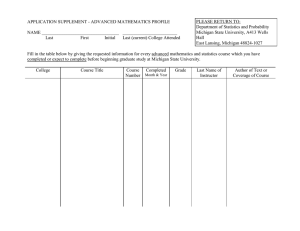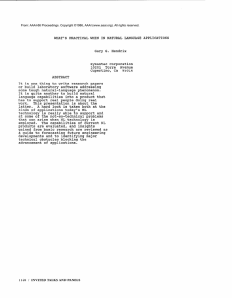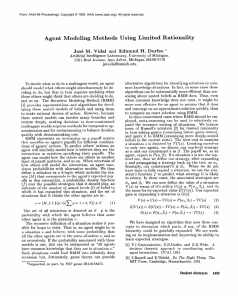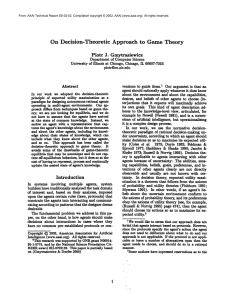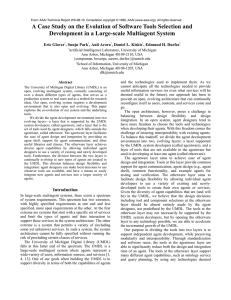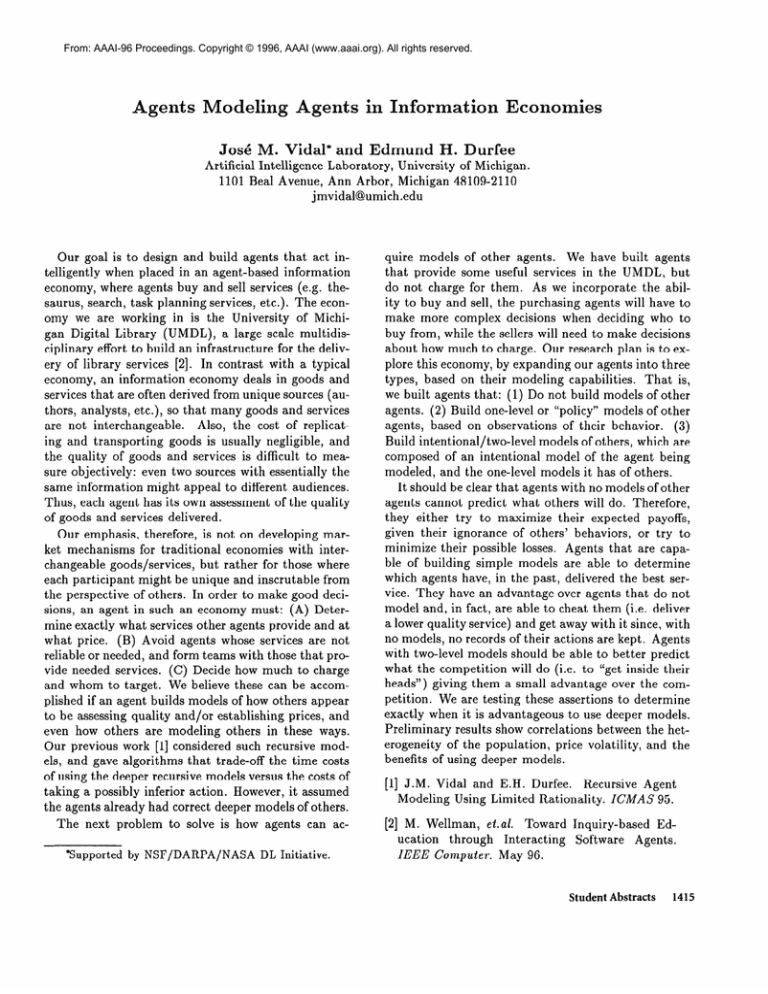
From: AAAI-96 Proceedings. Copyright © 1996, AAAI (www.aaai.org). All rights reserved.
Agents Modeling Agents in Information Economies
Jo& M. Vidal* and Edmund H. Durfee
Artificial Intelligence
Laboratory,
University
of Michigan.
1101 Beal Avenue, Ann Arbor, Michigan 48109-2110
jmvidal@umich.edu
Our goal is to design and build agents that act intelligently
when placed in an agent-based
information
economy, where agents buy and sell services (e.g. thesaurus, search, task planning services, etc.). The economy we are working in is the University
of Michigan Digital Library (UMDL), a large scale multidisciplinary effort to build an infrastructure
for the delivery of library services [2]. In contrast with a typical
economy, an information
economy deals in goods and
services that are often derived from unique sources (authors, analysts, etc.), so that many goods and services
are not interchangeable.
Also, the cost of replicating and transporting
goods is usually negligible,
and
the quality of goods and services is difficult to measure objectively:
even two sources with essentially
the
same information
might appeal to different audiences.
Thus, each agent has its own assessment of the quality
of goods and services delivered.
Our emphasis, therefore, is not on developing market mechanisms
for traditional
economies with interchangeable goods/services,
but rather for those where
each participant
might be unique and inscrutable
from
the perspective of others. In order to make good decisions, an agent in such an economy must: (A) Determine exactly what services other agents provide and at
what price. (B) Avoid agents whose services are not
reliable or needed, and form teams with those that provide needed services. (C) Decide how much to charge
and whom to target. We believe these can be accomplished if an agent builds models of how others appear
to be assessing quality and/or establishing
prices, and
even how others are modeling others in these ways.
Our previous work [l] considered such recursive models, and gave algorithms
that trade-off the time costs
of using the deeper recursive models versus the costs of
taking a possibly inferior action. However, it assumed
the agents already had correct deeper models of others.
The next problem to solve is how agents can acSupported
by NSF/DARPA/NASA
DL Initiative.
quire models of other agents.
We have built agents
that provide some useful services in the UMDL, but
do not charge for them.
As we incorporate
the ability to buy and sell, the purchasing
agents will have to
make more complex decisions when deciding who to
buy from, while the sellers will need to make decisions
about how much to charge. Our research plan is to explore this economy, by expanding our agents into three
types, based on their modeling capabilities.
That is,
we built agents that: (1) Do not build models of other
agents. (2) Build one-level or “policy” models of other
agents, based on observations
of their behavior.
(3)
Build intentional/two-level
models of others, which are
composed of an intentional
model of the agent being
modeled, and the one-level models it has of others.
It should be clear that agents with no models of other
agents cannot predict what others will do. Therefore,
they either try to maximize
their expected
payoffs,
given their ignorance
of others’ behaviors,
or try to
minimize their possible losses. Agents that are capable of building simple models are able to determine
which agents have, in the past, delivered the best service. They have an advantage over agents that do not
model and, in fact, are able to cheat them (i.e. deliver
a lower quality service) and get away with it since, with
no models, no records of their actions are kept. Agents
with two-level models should be able to better predict
what the competition
will do (i.e. to “get inside their
heads”) giving them a small advantage
over the competition.
We are testing these assertions to determine
exactly when it is advantageous
to use deeper models.
Preliminary
results show correlations
between the heterogeneity of the population,
price volatility,
and the
benefits of using deeper models.
[l] J .M. Vidal and E.H. Durfee.
Recursive Agent
Modeling Using Limited Rationality.
ICMAS 95.
[2] M. Wellman,
et.&
Toward
ucation
through
Interacting
IEEE Computer. May 96.
Inquiry-based
EdSoftware
Agents.
Student Abstracts
1415

